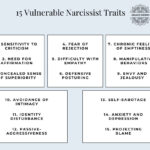Narcissistic Abuse Therapy | Best Therapy for Narcissistic Abuse
Embarking on the journey of healing from narcissistic abuse requires the right therapeutic approach that suits your personal needs and preferences. This insightful blog post delves into the different types of narcissistic abuse therapy and counseling.
We will start by exploring the diverse range of techniques and strategies available to empower individuals and guide them towards reclaiming their self-worth, strength, and inner peace.
One of the most empowering steps you can take to start your healing journey is learning and understanding narcissistic personality disorder to help you make sense out of things.
If you’re interested in healing from narcissistic abuse, I warmly welcome you to my Narcissistic Abuse Recovery Program. It’s an easy self-paced online course which you can do at your own pace. My signature program combines scientific and spiritual tools for holistic healing of the body, mind, and spirit.
Narcissistic Abuse Therapy – Different Types
There are several types of narcissistic abuse therapy modalities available, each catering to different needs. Knowing what’s available will help you choose the best therapy for narcissistic abuse based on your specific requirements. Let’s have a look at the following types of therapy for narcissistic abuse victims:
1. One-to-One Narcissist Abuse Therapy:
- You can find 1:1 online therapy for narcissistic abuse or in-person with a professional narcissistic abuse therapist near you.
- This type of narcissist abuse therapy involves individual sessions tailored to your unique experiences and healing journey.
- Individuals can cultivate a safe space to explore the effects of being in a relationship with a narcissist, develop coping strategies, and work towards healing from narcissistic abuse.
2. Group Therapy for Narcissistic Abuse:
- Individuals can join online or in-person support groups for dealing with narcissists and healing programs.
- These provide a supportive environment where individuals with similar experiences come together in a private and safe space.
- Facilitated by a therapist, a coach, or a counselor, a support group offers a space for sharing experiences, knowledge and education about narcissistic abuse symptoms, validation, and collective healing which is highly beneficial.
- Group therapy for narcissistic abuse enables participants to gain insights from others, build connections, learn how to manage narc abuse syndrome, and feel less isolated in their journey of recovery.
- This type of therapy for victims of narcissistic abuse helps individuals become aware of recurring patterns and identify the behavioral cycles associated with narcissists. People who suffer from Narcissistic Personality Disorder (NPD) often create similar relationship dynamics and engage in abusive behaviors. Through group therapy, individuals can gain the ability to recognize and understand these patterns.
Related: Setting Boundaries with a Narcissist
3. Narcissistic Abuse Counseling:
- Focused on providing guidance, support, and strategies to cope with narcissistic abuse as well as advice on how to deal with a narcissist.
- Typically involves regular counseling sessions with a qualified therapist, coach, or counselor.
- Helps individuals navigate the complex emotions, challenges, and aftermath of narcissistic abuse, fostering personal growth and resilience.
4. Cognitive-Behavioral Therapy (CBT):
- A goal-oriented therapeutic approach addressing thought patterns, emotions, and behaviors.
- Helps in recognizing and challenging negative beliefs instilled by narcissistic abuse.
- Equips individuals with practical tools and coping mechanisms to manage triggers, develop healthier self-perceptions, and cultivate positive behavior changes.
5. Trauma-Informed Therapy:
- Specifically designed to address the trauma resulting from narcissistic abuse.
- Focuses on creating a safe therapeutic environment to process and heal from the trauma.
- Utilizes techniques such as mindfulness, grounding exercises, somatic therapy, trauma-focused interventions, and practices like Yin Yoga to support individuals in their healing journey.
- Somatic therapy, a key component of trauma-informed therapy, recognizes the mind-body connection and helps individuals release stored trauma and tension through body-based techniques. This may involve gentle movement, breathwork, and somatic experiencing to promote healing at a physiological level. Additionally, practices like Yin Yoga, with its slow and nurturing postures, can aid in emotional release, relaxation, and cultivating a sense of safety within one’s own body.
- By integrating these techniques into trauma-informed therapy, individuals can access a holistic approach to healing, addressing both the psychological and physiological effects of narcissistic abuse. This comprehensive approach supports individuals in their journey towards reclaiming their well-being and finding inner resilience.
6. Dialectical Behavior Therapy (DBT):
- Combines individual therapy, group skills training, and coaching.
- Aims to develop emotional regulation, interpersonal effectiveness, and distress tolerance skills.
- Equips individuals with practical tools to manage intense emotions, improve relationships, and foster self-acceptance and personal growth.
- Through individual therapy sessions, individuals receive personalized guidance and support tailored to their specific needs. Group skills training provides opportunities to learn and practice essential skills such as emotion regulation, interpersonal effectiveness, distress tolerance, and mindfulness. Coaching and homework assignments offer additional support and reinforcement outside of therapy sessions.
- By engaging in DBT, individuals acquire practical tools and strategies to effectively manage overwhelming emotions, enhance communication and relationship skills, build resilience in the face of distress, and cultivate self-acceptance and personal growth.
7. EMDR Therapy (Eye Movement Desensitization and Reprocessing):
- A specialized therapy to alleviate distress caused by traumatic experiences.
- Utilizes eye movements or other bilateral stimulation techniques to process and resolve trauma.
- Helps individuals reprocess traumatic memories related to narcissistic abuse, reducing their emotional impact and promoting healing.
8. Spiritual Life Coaching:
- Offers a unique approach to healing from narcissistic abuse by integrating spiritual principles and practices.
- Provides guidance, support, and mentorship to individuals seeking to reconnect with their spiritual selves.
- Focuses on exploring deeper meaning, purpose, and inner wisdom to foster personal growth and healing.
- A narcissistic abuse coach can help individuals acknowledge the importance of spirituality in the healing journey from narcissistic abuse. Participants learn to tap into inner resources, cultivate self-compassion, and find strength through spiritual practices. These include meditation, prayer, visualization, and energy healing. This type of coaching aligns individuals with core values, intuition, and fosters spiritual wholeness and empowerment.
- By integrating spiritual principles and practices, individuals explore and restore their spiritual connection, finding solace, guidance, and renewed hope after narcissistic abuse.
- Spiritual life coaching offers a unique pathway to healing that integrates the mind, body, and spirit, fostering holistic well-being and personal transformation.
Related: Do Narcissists Cry?
Valuable Lessons from Narcissistic Abuse Therapy

Narcissistic abuse therapy offers invaluable insights and transformative lessons to those seeking healing and recovery from the impact of narcissistic abuse. Explore the key lessons individuals can learn through this therapeutic journey:
- Understanding Narcissistic Abuse Dynamics:
- Gain awareness of the manipulative tactics and power dynamics employed by narcissists, and what qualifies as narcissistic abuse.
- Learn to identify signs of narcissistic abuse in a relationship, red flags, patterns, and cycles of abuse to protect yourself in the future.
- Building Self-Empowerment:
- Develop a strong sense of self-worth and reclaim personal power after experiencing narcissistic abuse.
- Learn strategies to set boundaries, assert yourself, and prioritize your well-being so you are no longer a victim of narcissism and abuse.
- Healing Emotional Wounds:
- Navigate the complex emotions associated with narcissistic abuse, such as betrayal, guilt, and shame.
- Learn effective coping mechanisms to process and heal emotional trauma, fostering inner resilience.
- Establishing Healthy Relationship Patterns:
- Unlearn unhealthy relationship habits and develop healthier patterns for future connections.
- Acquire skills in effective communication, establishing trust, and fostering healthy boundaries.
- Cultivating Self-Care and Self-Compassion:
- Discover the importance of self-care and self-compassion in the recovery journey.
- Learn techniques to prioritize self-nurturing activities and develop a compassionate relationship with oneself.
- Nurturing Personal Growth and Authenticity:
- Embrace personal growth opportunities and embark on a journey of self-discovery.
- Learn to trust your instincts, honor your authentic self, and pursue a fulfilling life aligned with your values.
My Related Services:
–Narcissistic Abuse Recovery Program: Join a structured program that provides tools, resources, and guidance to help you navigate and heal from the impact of narcissistic abuse.
–Mindfulness Meditation Practice: Discover the power of mindfulness with me as your meditation teacher. This practice has been a transformative tool in helping me gain mental clarity, rebuild self-trust, and respond consciously rather than reacting impulsively. Book a free call today and learn how mindfulness can calm your nervous system and bring peace into your life.
–Email Advice: Get guidance, insights, and support directly to your inbox.
FAQs
Narcissistic abuse can be addressed through various types of therapy which include:
1. One-to-One Therapy
2. Group Therapy for Narcissistic Abuse
3. Narcissistic Abuse Counseling
4. Cognitive-Behavioral Therapy (CBT)
5. Trauma-Informed Therapy
6. Dialectical Behavior Therapy (DBT)
7. EMDR Therapy (Eye Movement Desensitization and Reprocessing)
8. Spiritual Life Coaching
Therapists treat narcissistic abuse by providing support, validation, and helping individuals navigate the effects of abuse. They may employ techniques such as helping clients recognize patterns, develop coping strategies, set boundaries, heal from trauma, and foster personal growth and empowerment.
Yes, there are support groups specifically designed for individuals who have experienced narcissistic abuse. These support groups provide a safe space for sharing experiences, receiving validation, gaining insights, and finding support from others who have gone through similar experiences. Support groups can be in-person or online, offering valuable community and understanding for survivors of narcissistic abuse.
Additional Resources:
Narcissist Checklist
12 Traits of a Narcissist
Divorcing a Narcissist
Why a Narcissist Won’t Divorce You






